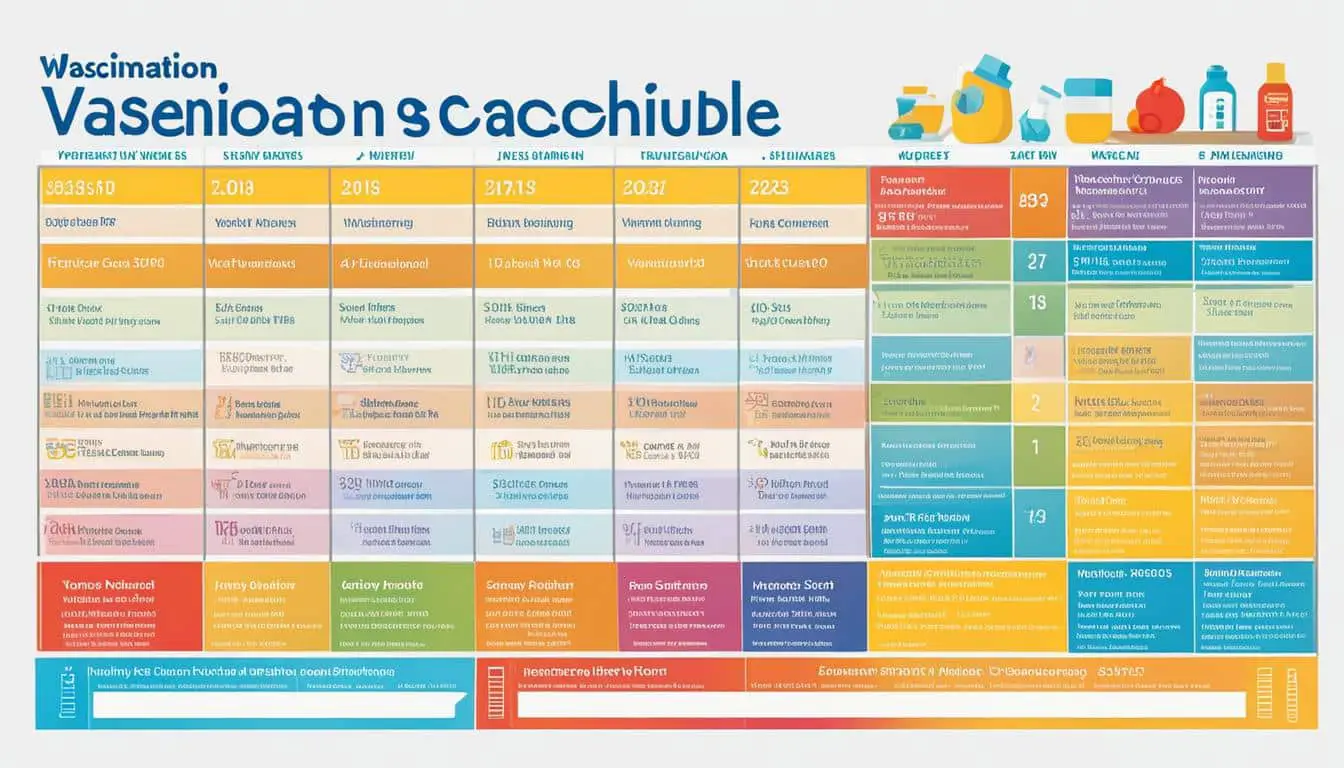Vaccination Schedule for Babies: What Parents Need to Know
Understanding the importance of a baby vaccination schedule is crucial for every parent. Vaccines play a vital role in protecting babies from preventable diseases and complications, ensuring their overall health and well-being. The vaccination schedule, recommended by experts and updated annually, outlines the timeline for administering vaccines starting from birth and continuing throughout the first few years of life.
Each vaccine serves a specific purpose, aiding in building immunity against different diseases. By following the recommended vaccination schedule, parents can ensure that their child receives the necessary vaccines on time, providing them with maximum protection. It is essential for parents to consult their healthcare provider and stay informed about the schedule to safeguard their baby’s health.
Key Takeaways:
- The vaccination schedule is crucial in protecting babies from preventable diseases and complications.
- Vaccines are recommended by experts and updated annually.
- Following the vaccination schedule ensures that each vaccine is administered at the appropriate age.
- Vaccines protect against serious illnesses such as whooping cough, meningitis, and hepatitis B.
- Consulting healthcare providers and staying informed about the schedule ensures timely vaccination for maximum protection.
Recommended Vaccines for Babies
When it comes to protecting your baby’s health, following the recommended vaccination schedule is of utmost importance. Vaccines play a crucial role in safeguarding infants from preventable diseases and complications. The Centers for Disease Control and Prevention (CDC) recommends a series of vaccines to be administered at specific ages throughout the first few years of life. These vaccines are designed to build immunity and protect against serious illnesses that can pose a threat to your baby’s well-being.
The list of recommended vaccines for babies includes:
- Diphtheria, Tetanus, and Pertussis (DTaP): Offers protection against these three highly contagious diseases.
- Haemophilus Influenzae Type b (Hib): Guards against a bacteria that can cause meningitis, pneumonia, and other serious infections.
- Hepatitis B: Provides immunity against hepatitis B virus, which can lead to liver damage and other complications.
- Rotavirus: Protects against a common virus that causes severe diarrhea and dehydration in infants.
- Poliovirus: Prevents polio, a highly infectious disease that can cause paralysis and even death.
- Pneumococcal Conjugate: Guards against pneumococcal bacteria, which can cause meningitis, pneumonia, and bloodstream infections.
- Varicella (Chickenpox): Offers immunity against the varicella-zoster virus, which causes chickenpox.
- Measles, Mumps, and Rubella (MMR): Provides protection against these three viral diseases.
These vaccines are safe and highly effective in preventing the mentioned diseases and their potential complications. By staying up-to-date with the vaccination schedule, you are taking proactive measures to safeguard your baby’s health and well-being. It is important to consult your healthcare provider to ensure that your child receives each vaccine at the recommended age.

Being proactive in following the recommended vaccination schedule not only protects your own child but also contributes to the concept of herd immunity. By vaccinating your baby, you help create a barrier that prevents the spread of diseases within the community, ultimately safeguarding individuals who are unable to receive vaccines due to medical reasons. Vaccines have made a significant impact in reducing the incidence of many diseases and have saved millions of lives worldwide.
As parents, it is crucial to educate ourselves about the importance and benefits of vaccines. By making informed decisions and ensuring our children receive the recommended vaccines, we are taking an essential step towards safeguarding their health and the health of our communities.
Importance of Following the Vaccination Schedule
As a parent, I understand the importance of following the vaccination schedule for my baby’s health and well-being. Childhood immunizations play a vital role in preventing the occurrence and spread of infectious diseases. By ensuring that my child receives the recommended vaccinations, I am taking proactive steps to protect them from potentially serious illnesses.
Vaccines have been extensively studied and proven to be safe and effective in preventing diseases. They not only safeguard individual children but also contribute to the concept of herd immunity. This means that by vaccinating our children, we are helping to protect vulnerable individuals who cannot receive vaccines due to medical reasons or age.
It is important to note that vaccines have made a significant impact in disease prevention. Thanks to widespread immunization efforts, the incidence of many diseases has drastically reduced, saving millions of lives. By following the vaccination schedule, we are not only safeguarding our own children but also playing a part in protecting the larger community.
As parents, we have a responsibility to educate ourselves about the importance and benefits of childhood immunizations. Making informed decisions regarding vaccination is crucial for the health and well-being of our children. By prioritizing vaccine effectiveness and disease prevention, we can ensure that our children grow up healthy and protected.
FAQ
Why is understanding the baby vaccination schedule important?
Understanding the importance of a baby vaccination schedule is crucial for every parent. It ensures that your child receives vaccines at the recommended ages to protect them from preventable diseases and complications.
Which vaccines are recommended for babies?
The recommended vaccines for babies include diphtheria, tetanus, pertussis (DTaP), haemophilus influenzae type b (Hib), hepatitis B, rotavirus, poliovirus, pneumococcal conjugate, varicella (chickenpox), and measles, mumps, rubella (MMR).
When should each vaccine be administered?
Each vaccine is administered at specific ages according to the vaccination schedule. It is important to consult your healthcare provider to ensure your child receives vaccines on time.
What diseases do these vaccines protect against?
These vaccines protect against serious illnesses such as whooping cough, meningitis, hepatitis B, rotavirus infection, polio, pneumonia, chickenpox, and measles.
Are vaccines safe and effective?
Vaccines are safe and effective in preventing diseases and their complications. They have been proven to be safe through extensive research and testing.
Why should parents follow the recommended vaccination schedule?
Following the vaccination schedule is vital for the health and well-being of babies. Childhood immunizations prevent the occurrence and spread of infectious diseases.
How do vaccines contribute to herd immunity?
By vaccinating your child, you are not only protecting them but also contributing to herd immunity. This helps protect vulnerable individuals who cannot receive vaccines, such as those with weakened immune systems.
Have vaccines made a significant impact on disease prevention?
Yes, vaccines have significantly reduced the incidence of many diseases and saved millions of lives. They are a crucial tool in public health.
How can parents make informed decisions about vaccines?
Parents should educate themselves about the importance and benefits of vaccines. They can consult with their healthcare provider, read reputable sources, and ask questions to make informed decisions for their child’s health.






